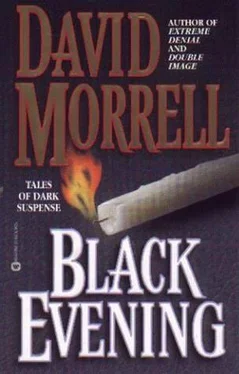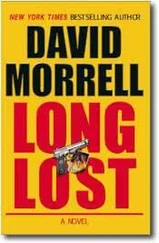David Morrell - Black Evening
Здесь есть возможность читать онлайн «David Morrell - Black Evening» весь текст электронной книги совершенно бесплатно (целиком полную версию без сокращений). В некоторых случаях можно слушать аудио, скачать через торрент в формате fb2 и присутствует краткое содержание. Жанр: Ужасы и Мистика, на английском языке. Описание произведения, (предисловие) а так же отзывы посетителей доступны на портале библиотеки ЛибКат.
- Название:Black Evening
- Автор:
- Жанр:
- Год:неизвестен
- ISBN:нет данных
- Рейтинг книги:4 / 5. Голосов: 1
-
Избранное:Добавить в избранное
- Отзывы:
-
Ваша оценка:
- 80
- 1
- 2
- 3
- 4
- 5
Black Evening: краткое содержание, описание и аннотация
Предлагаем к чтению аннотацию, описание, краткое содержание или предисловие (зависит от того, что написал сам автор книги «Black Evening»). Если вы не нашли необходимую информацию о книге — напишите в комментариях, мы постараемся отыскать её.
Black Evening — читать онлайн бесплатно полную книгу (весь текст) целиком
Ниже представлен текст книги, разбитый по страницам. Система сохранения места последней прочитанной страницы, позволяет с удобством читать онлайн бесплатно книгу «Black Evening», без необходимости каждый раз заново искать на чём Вы остановились. Поставьте закладку, и сможете в любой момент перейти на страницу, на которой закончили чтение.
Интервал:
Закладка:
Eric sighed now as he lugged the typewriter across the living room and set it on the chipped discolored kitchen counter. He'd have set it on the table, but he knew the table would collapse from the weight. Even so, the counter groaned, and Eric held his breath. Only when the counter stopped protesting did he exhale.
He watched water dripping from the rusty kitchen tap. He glanced at the noisy kitchen clock which, although he frequently reset it, was always a half hour fast. Subtracting from where the hands were on the clock, he guessed that the time was half past two. A little early for a drink, but I've got a good excuse, he told himself. A lot of good excuses. Cheap Scotch from the previous night's party. He poured an ounce and swallowed it, gasping from the warmth that reached his complaining empty stomach.
Well, there's nothing here to eat, he told himself and poured another drink. This albatross took all the money I'd saved for food. He felt like kicking it, but since it wasn't on the floor, instead he slammed it with his hand. And nearly broke his fingers. Dancing around the room, clutching his hand, he winced and cursed. To calm himself, he poured more Scotch.
Christ, my column's due tomorrow, and I haven't even started. If I don't meet my deadline, I'll lose the only steady job I've got.
Exasperated, Eric went into the living room where his old, faithful Olympia waited on its altar-like desk opposite the door, the first thing people saw when they came in. This morning, he'd tried to start the column, but distracted by his broken kitchen chair, he hadn't been able to find the words. Indeed, distraction from his work was common with him.
Now again he faced the blank page staring up at him. Again his mind blocked, and no words came. He sweated more profusely, straining to think. Another drink would help. He went back to the kitchen for his glass. He lit a cigarette. No words. That's always been my problem. He gulped the Scotch. Art was painful. If he didn't suffer, his work would have no value. Joyce had suffered. Kafka. Mann. The agony of greatness.
In the kitchen, Eric felt the Scotch start to work on him. The light paled. The room appeared to tilt. His cheeks felt numb. He rubbed his awkward fingers through his thick blond neck-long hair.
He peered disgustedly at the thing on the kitchen counter. "You," he said. "I'll bet your keys don't even work." He grabbed a sheet of paper. "There." He turned the roller, and surprisingly it fed the paper smoothly. "Well, at least you're not an absolute disaster." He drank more Scotch, lit another cigarette.
His column didn't interest him. No matter how he tried, he couldn't think of any theories about modern fiction. The only thing on his mind was, what would happen in two weeks when Simmons came to get the rent. "It isn't fair. The System's against me."
That inspired him. Yes. He'd write a story. He'd tell the world exactly what he thought about it. He already knew the title. Just four letters. And he typed them: Scum .
The keys moved easier than he'd expected. Smoothly. Slickly. But as gratified as Eric felt, he was also puzzled – for the keys typed longer than was necessary.
His lips felt thick. His mind felt sluggish as he leaned down to see what kind of imprint the old ribbon had made. He blinked and leaned much closer. He'd typed Scum , but what he read was Fletcher's Cove .
Astonishment made him frown. Had he drunk so much he couldn't control his typing? Were his alcohol-awkward fingers hitting keys at random? No, for if he typed at random, he ought to be reading gibberish, and Fletcher's Cove , although the words weren't what he'd intended, certainly wasn't gibberish.
My mind, he told himself, it's playing tricks. I think I'm typing one thing, but unconsciously I'm typing something else. The Scotch is confusing me.
To test his theory, Eric concentrated to uncloud his mind and make his fingers more alert. Taking care that he typed what he wanted, he hit several keys. The letters clattered onto the paper, taking the exact amount of time they should have. Something was wrong, though. As he frowned toward the page, he saw that what he'd meant to type (a story) had come out as something else (a novel) .
Eric gaped. He knew he hadn't written that. Besides, he'd always written stories. He'd never tried – he didn't have the discipline – to write a novel. What the hell was going on? In frustration, he quickly typed, The quick brown fox jumped over the lazy dog .
But this is what he read: The town of Fletcher 's Cove had managed to survive, as it had always managed to survive, the fierce Atlantic winter .
That awful tingle again. Like ice. This is crazy, he thought. I've never heard of Fletcher's Cove, and that redundant clause, it's horrible. It's decoration, gingerbread.
Appalled, he struck the keys repeatedly, at frenzied random, hoping to read nonsense, praying he hadn't lost his mind.
Instead of nonsense, this is what he saw: The townsfolk were as rugged as the harsh New England coastline. They had characters of granite, able to withstand the punishments of nature, as if they had learned the techniques of survival from the sturdy rocks along the shore, impervious to tidal onslaughts .
Eric flinched. He knew he hadn't typed those words. What's more, he never could have forced himself to type them. They were terrible. Redundancy was everywhere, and Lord, those strained commercial images. The sentences were hack work, typical of gushy bestsellers.
Anger seized him. He typed frantically, determined to discover what was happening. His writer's block had disappeared. The notion of bestsellers had inspired him to write a column, scorning the outrageous decadence of fiction that was cynically designed to pander to the basest common taste.
But what he read was: Deep December snows enshrouded Fletcher's Cove. The land lay dormant, frozen. January. February. The townsfolk huddled, imprisoned near the stove and hearth inside their homes. They scanned the too-familiar faces of their forced companions. While the savage wind howled past their bedroom windows, wives and husbands soon grew bored with one another. March came with its early thaw. Then April, and the land became alive again. But as the warm spring air rekindled nature, so within the citizens of Fletcher's Cove, strong passions smoldered .
Eric stumbled toward the Scotch. This time he ignored the glass and drank straight from the bottle. He shook, nauseous, scared to death. As the tasteless Scotch dribbled from his lips, his mind spun. He clutched the kitchen counter for support. In his delirium, he thought of only three explanations. One, he'd gone insane. Two, he was so drunk that, like the wino on the stairs, he was hallucinating. Three, the hardest to accept this wasn't an ordinary typewriter.
The way it looks should tell you that.
Good God.
The telephone's harsh ring jolted him. He nearly slipped from the counter. Fighting for balance, he teetered toward the living room. The phone was one more thing he'd soon lose, he knew. For two months, he'd failed to pay the bill. The way his life was going, he suspected that this call was from the telephone company, telling him it was canceling his service.
He fumbled to pick up the phone. Hesitant, he said, "Hello," but those two syllables slurred, combining as one. "… Lo," he said and repeated in confusion. "… Lo?"
"Is that you, Eric?" a man's loud nasal voice told him. "You sound different. Are you sick? You've got a cold?" The editor of Village Mind .
"No, I was working on my column." Eric attempted to control the drunken thickness in his voice. "The phone surprised me."
"On your column? Listen, Eric, I could break this to you gently, but I know you're strong enough to take it on the chin. Forget about your column. I won't need it."
Читать дальшеИнтервал:
Закладка:
Похожие книги на «Black Evening»
Представляем Вашему вниманию похожие книги на «Black Evening» списком для выбора. Мы отобрали схожую по названию и смыслу литературу в надежде предоставить читателям больше вариантов отыскать новые, интересные, ещё непрочитанные произведения.
Обсуждение, отзывы о книге «Black Evening» и просто собственные мнения читателей. Оставьте ваши комментарии, напишите, что Вы думаете о произведении, его смысле или главных героях. Укажите что конкретно понравилось, а что нет, и почему Вы так считаете.












